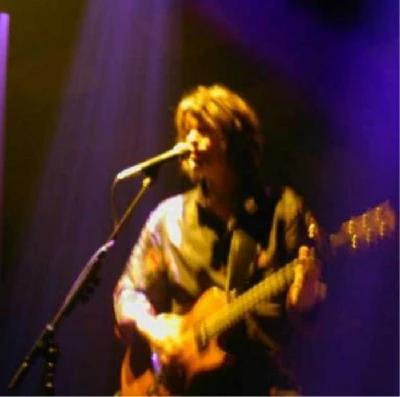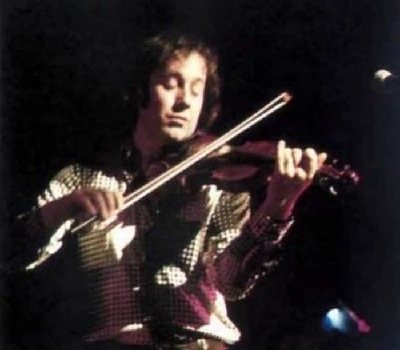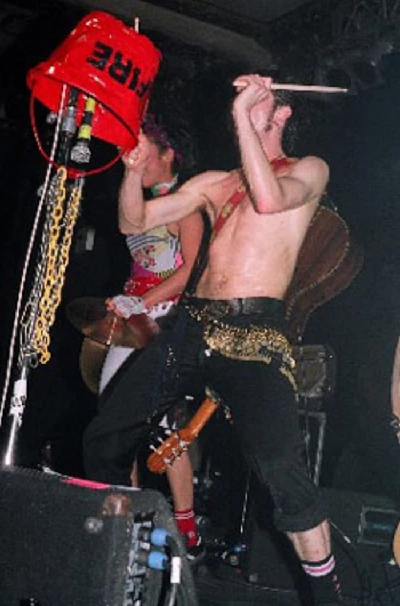Waterboys
-
Royal Concert Hall, Glasgow, 5/10/2003
published: 15 /
10 /
2003

The Waterboys' recent tour has found them playing shows of two halves that consist of both an acoustic and an electric set. In their 21st year, long-term fan John Clarkson finds them never more "complete"
Article
The Waterboys frontman Mike Scott has always been most creative when he has had someone else in his long-serving group to spark and to play off against.
In the early days of the band's now 21 year old history,he enjoyed especially close working ties with saxophonist Anthony Thistlethwaite and keyboardist and percussionist Karl Wallinger. While other musicians in the ever-evolving Waterboys would come and go, the Leicester-born Thistlethwaite and Welshman Wallinger would , over the course of three albums, 'The Waterboys' (1983), 'A Pagan Place' (1984) and 'This is the Sea' (1985), help the Edinburgh-bred Scott to create the 'Big Music', the spiritually-wandering and mini-epic rock sound that he first became famed for.
By 1986 Wallinger had gone, and Scott had found a new musical muse in the shape of Irish fiddler, Steve Wickham, who joined the band after playing on 'The Pan Within', one of the tracks from 'This is the Sea'. The Waterboys' fourth album, the much-acclaimed 'Fisherman's Blues', which was recorded during a two year semester in Wickham's native Galway, came out in 1988, and, more folk-flavoured, merged traditional Irish music with Scott's rock influences.
Wickham remained with the Waterboys to record their next album, the similar-veined 'Room to Roam'. Within days though of its release in 1990 ,he quit the band. Thistlethwaite left too in 1992. The rest of the 90's would prove to be lean years for Scott. A sixth Waterboys album, 'Dream Harder' (1993), recorded in New York with session musicians, had its moments, but lacked the energy and earthy passion of its predecessors. Two solo albums, 'Bring 'Em All In' (1995) and 'Still Burning' (1998), found him similarly coasting, and it was only after he reformed the Waterboys in 1999 with a new protege, London-based pianist Richard Naiff, that Scott returned to form.
The group's latest two albums, the hard-edged 'A Rock in the Weary Land' (2000) , which found the Waterboys revisiting the Big Music sound of the 80's, and this year's largely acoustic 'Universal Hall', for which Wickham has returrned to the fold, have both gone down well with the critics and the public alike. Tonight's gig at the 2000 seated Glasgow Royal Concert Hall, the Waterboys' second there in the space of 8 months, is packed to capacity.
With such a vast, varying back catalogue, the Waterboys have no lack of material to compose a set list from and tonight's sprawling two and a half hour long show indeed marries together the traditional and the contemporary,and crowd-pleasers and 'Greatest Hits' with some genuine oddities and surprises. It is a show of two halves, beginning with an acoustic set of an hour in length, and then concluding with a longer electric set.
Much of the first set is drawn from the new album. Composed and recorded in Findhorn, the North Eastern Scottish spiritual community, where Scott has a house and lives for part of the year, the songs on 'Universal Hall' have a low-key and intimate feel, their mellow charms providing the perfect antidote and contrast to the howling gale which is raging across Glasgow and down Buchanan Street outside.
Scott, as always, makes an engaging frontman. 'Bring 'Em All In' has him pacing the stage and booming out the vocals, often metres away from the mic, accompanied by just Naiff's stark piano. A cover of the Stones 'You Can't Always Get What You Want' is dropped seemingly imprompto into the back of the set. It comes appropriately enough a few songs on after Scott has told the audience that he has spent some of the day in a nearby Waterstone's and has bought Chris Salewicz's book on 'Mick and Keith' as reading matter for the tour. The acoustic set is closed with a fine rendition of Van Morrison's 'Sweet Thing'. Drawn and improved upon from the 'Fisherman's Blues' album, it has Scott improvising a hilarious story about chasing a Harpie-like girl in the rain through the streets of Glasgow, and concludes by segueing,as on the record, into the Beatles 'Blackbird'.
Entertaining as he is though, Scott is more than matched by the other two musicians on stage with him. Wickham brings a florid charm to proceedings with his casually flamboyant fiddle playing, and occasionally also flits onto mandolin. Naiff , his shaggy hair bouncing up and down in time to the music, his hands happily slapping his thighs on the rare moments when he isn't playing, meanwhile proves himself every bit Scott's equal for bubbly enthusiasm.
For the second set, the trio are joined by two additional musicians, bassist Steve Walters and drummer Carlos Hercules. Both Walters and the improbably-titled Hercules, the bands' first black members, are on first impression an odd choice for Scott to have selected to become the latest in the long line of recruits to the Waterboys. They come as a team, and have worked together before as session musicians for the British soul diva Beverley Knight and the former Wet Wet Wet star Marti Pellow. Both, however, are obviously thoroughly revelling in their new contrasting status of playing in a rock band, and each brings their own stamp of personality to the group. The perpetually-grinning, roly-poly Hercules whacks his drum kit with great gusto, while the stone-faced "Big Steve', clad in an expensive white, flowery shirt, for which he takes a good-natured slagging from the more casual Scott, strikes out some magnificently terse bass lines. 'Medicine Bow' is kept stripped down and short, while 'The Pan Within' from the same era in exact opposite is extended and padded out over fifteen minutes. The set is finished with a exhilarating , waltzing 'Fisherman's Blues', which to the horror of the up-market Royal Concert Hall's security, has much of the first few rows of the audience out their seats and throwing themselves around down at the front of the stage.
For encores, the Waterboys open with a rousing version of their No. 2 1990 hit. 'The Whole of the Moon', that finds Scott as well as Naiff on piano. They then, displaying further their full range and potential, conclude with the rollicking 'Further Up, Further In', an obscurity from the under-rated 'Room to Roam' album, and 'Wild Mountain Thyme', a meandering and gentle old Scots traditional.
Tonight's gig shows the Waterboys at their most complete. One of the problems of some of the Waterboys shows of the past has been that they have been dominated by Scott and whoever has been immediately closest to him , with the other players on the stage reduced to often bland, secondary roles. Of course, as the ugly tour T-shirts on sale in the foyer, which have a blown-up mug shot of Scott embossed in orange on their front, show, the Waterboys will always be at one level primarily his band . This Glasgow gig, with its split sets, and emphasis on the individual, has, however, given the other four members of the group-Wickham, Naiff, and the welcome additions of Walters and Hercules-an almost equal chance to leave their mark and to shine. The Waterboys, in their 21st year, have come of age gracefully.
Acoustic Set :
Ain't No Words for the Things I'm Feeling
Universal Hall
Christ in You
Bring 'Em All In
I've Lived Here Before
A Life of Sundays
A Man is in Love
When Ye Go Away
You Can't Always Get What You Want
Sweet Thing/Blackbird
Electric Set :
Every Breath is Yours
My Dark Side
Peace of Iona
Strange Boat
Medicine Bow
The Pan Within
Open
Glastonbury Song
Always Dancing, Never Getting Tired
Fisherman's Blues
Encores :
The Whole of the Moon
Further Up, Further In
Wild Mountain Thyme
Band Links:-
https://www.mikescottwaterboys.com/
https://www.facebook.com/WaterboysMusi
https://www.instagram.com/waterboysmus
Have a Listen:-
Picture Gallery:-

